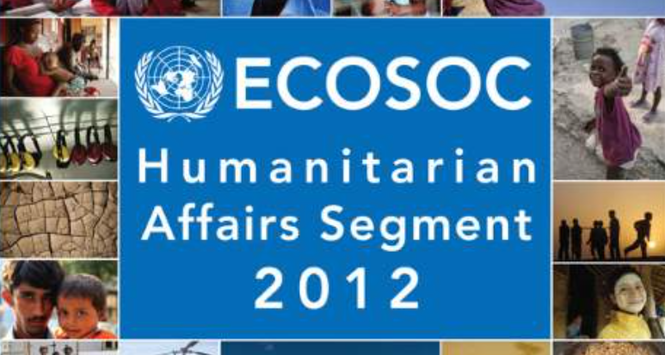
This year, the United Nations Economic and Social Council (ECOSOC) continued its engagement and interest in international disaster response laws, rules and principles (IDRL). This was reflected in a dedicated side event at its annual “Humanitarian Affairs Segment” as well as a resolution that encouraged states to make use of the IDRL Guidelines and drew attention to the pilot “Model Act on the Facilitation and Regulation of International Disaster Relief and Initial Recovery Assistance.”
Side event: “in the driver’s seat”
The side event, held on July 20 at UN headquarters in New York, was entitled “In the driver’s seat: How affected states are becoming better prepared to facilitate and manage international disaster cooperation,” and focused on the progress that a number of states have made in implementing the recommendations of the IDRL Guidelines. In his opening remarks, panel chair Ambassador Libran Cabactulan of the Philippines observed that his country had repeatedly been faced with regulatory dilemmas linked to international disaster assistance, including problems of coordination, poor quality goods and inappropriate items. His government had cooperated with the Philippines Red Cross in a dedicated seminar in Manila in June and planned to take steps to strengthen its existing procedures.
International Federation of Red Cross and Red Crescent Societies (IFRC) Secretary-General Bekele Geleta pointed out that when major disasters occur, people from around the world are often willing to help and the lack of domestic legal framework can stand in the way of the right aid arriving at the right time. “Legislation is a part of disaster preparedness,” he asserted, “and that is why the Red Cross and Red Crescent felt it had to do something to support governments, whether from rich or poor countries, to look at their laws and procedures.”
Colombian Deputy Permanent Representative Camilo Miguel Ruiz described the new disaster management legislation adopted in his country earlier in the year. It addressed not only emergency assistance but also disaster prevention, mitigation, domestic assistance, rehabilitation and reconstruction. It also required the government to develop a strategic plan to promote and manage international assistance. Since 2010, the government has been collaborating with the Colombian Red Cross on a study to examine its current procedures for international assistance and both will work together on the new plan.
Mozambique Red Cross (MRC) Secretary-General Americo Ubisse described the collaborative study that MRC had undertaken with the government over the previous year concerning the country’s legal preparedness for international assistance. He also pointed out some past challenges, including delays in customs clearance of imported medications as well as the receipt from abroad of unsolicited and expired medications. Preliminary recommendations from the study had already resulted in changes to Mozambique’s laws on medications and are currently being used as part of the development of a new disaster management bill.
IFRC Disaster Law Programme David Fisher noted the leadership of the Philippines, Colombia and Mozambique in this area and that a number of other countries were starting to follow suit. The IFRC and its members were currently supporting governments in over two dozen countries where new legislation was under development. They hoped that more would take up the issue before their next disaster. To support this, the IFRC together with UN OCHA and the Inter-Parliamentary Union had developed the Model Act (mentioned above), which was currently being piloted.
Resolution on humanitarian assistance
At the end of the Humanitarian Affairs Segment, ECOSOC member states adopted a resolution on “strengthening of the coordination of emergency humanitarian assistance of the United Nations” (available). With regard to IDRL, the resolution:
“Welcome[d] the initiatives undertaken at the regional and national levels in relation to the implementation of the Guidelines for the Domestic Facilitation and Regulation of International Disaster Relief and Initial Recovery Assistance adopted at the thirtieth International Conference of the Red Cross and Red Crescent, held in Geneva from 26 to 30 November 2007, and encourages Member States and, where applicable, regional organizations to take further steps to review and strengthen operational and legal frameworks for international disaster relief, taking into account, as appropriate, those Guidelines, and note[d] the efforts of the International Federation of Red Cross and Red Crescent Societies, the Office for the Coordination of Humanitarian Affairs of the Secretariat and the Inter-Parliamentary Union to develop a model act on the subject, which were welcomed at the thirty-first International Conference of the Red Cross and Red Crescent, held in Geneva from 28 November to 1 December 2011.”